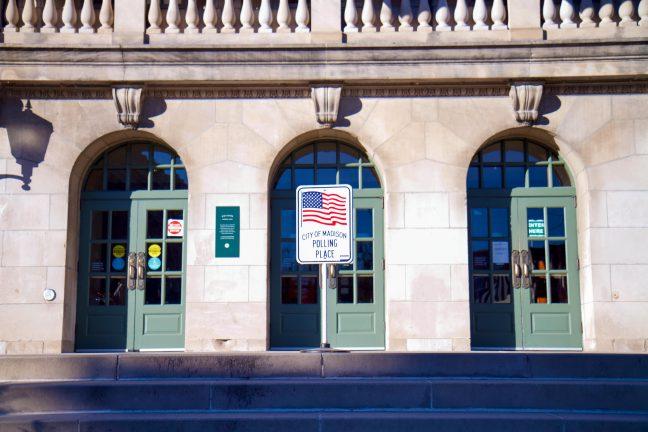Wisconsin’s Spring Election and Presidential Preference Vote will be held April 2, according to Bring it to the Ballot. Candidates for the Democratic and Republican presidential primaries will be at the top of the ballot, according to the Wisconsin Elections Commission.
President Biden and former President Donald Trump have already secured their party nominations following the Super Tuesday elections at the beginning of March, according to the Associated Press. But, there is still much for the Trump and Biden to gain from performing well April 2, before the Nov. 5 Presidential Election, University of Wisconsin professor of Political Science Barry Burden said.
“In some ways, the primary ballot has now become a kind of signal to the parties about how enthusiastic voters are about their nominees, or, whether they want to send a message that they’re discontent in some way,” Burden said.
Voters dissatisfied with Biden and Trump can opt to vote for other candidates or write a name in as a form of protest, Burden said.
Further, securing as many delegates as possible — not simply the minimum amount required to secure the nomination — is a way for candidates to project strength, Burden said.
“These ballots might seem superficial, but they actually do determine how many delegates each candidate will have at their conventions this summer,” Burden said.
Also on the ballot will be non-partisan races varying by residency, according to the Wisconsin Elections Commission. Madison voters will decide on one Court of Appeals judgeship, five Dane County Circuit Court judgeships, one Dane County Supervisor race and two Madison Metropolitan School District School Board Member seats.
Despite local contests not receiving much attention from voters, race outcomes are sure to have lasting impacts, Burden said. The Dane County Supervisor race is especially pertinent for student voters, Burden said.
“The supervisors are essentially the City Council for the county of Dane,” Burden said. “They oversee the county jail, airport, zoo and lots of things that the county operates and there are a couple of those races in the Madison area that are contested, so students might see a contested supervisor race on their ballot.”
Student voters will decide between incumbent supervisor Jay Brower and UW alumni Travis Austin come April 2, according to previous reporting from The Badger Herald.
Despite spring elections having a direct impact on their daily lives, student turnout is typically low compared with that of the fall elections, Burden said.
“It’s not a time of the year when students are thinking about elections much, they’re sort of anticipating what’s going to happen this fall,” Burden said. “But they are really important to students’ daily lives. I mean, the Madison School District, the running of the county, the local court system, those are all things that students would have some interaction with during their time at UW.”
Strong student turnout is important for supporting younger candidates who may be reluctant to run otherwise, Chair of Chup, Go Vote! and UW student Chandra Chouhan said. Chup, Go Vote! is a Madison-based nonpartisan non-profit voter engagement organization, according to Chouhan.
Young people aiming to run for office are often unable to overcome disparities in campaign funds and outreach capabilities their establishment counterparts hold, Chouhan said.
“There’s a lot of people who are reluctant to run. Establishment politicians run because they’ve accrued the money to do so, so they have the greatest outreach, but young people don’t have that financial infrastructure behind them,” Chouhan said.
Young potential candidates are more likely to run if they observe high student turnout, Chouhan said.
There will also be two referenda on the spring ballot, according to the Wisconsin Elections Committee. The referenda come from a proposal authored by Wisconsin State Assembly Republicans, according to the Milwaukee Journal Sentinel.
In answering the referenda, voters will be amending the state constitution to address Wisconsin’s elections policies, Burden said.
“[The first provision] would ban private funds from being used to help run elections in the state, which were used in 2020 extensively,” Burden said. “The other issue would ban anyone who’s not an election official from taking an active part in running elections. So volunteers or interest groups or municipal officials.”
Voters can get a full look at their ballot by providing an address MyVote Wisconsin. Here, students can also register to vote at on-campus polling places, according to MyVote Wisconsin.
To vote, students will need an acceptable form of voter identification, Burden said. Those without a photo ID listed on the MyVote Wisconsin website can obtain and use a student voter complaint ID through the WisCard office at Union South, according to the UW website.
Chup, Go Vote! will be outside East Campus mall handing out voter guides containing polling locations, voter registration guidelines and candidate information April 1 and 2, Chouhan said.
“Everyone’s going to be out and about the day after they come back [from spring break],” Chouhan said. “So we might as well be in an area where there’s a lot of traffic. There’s a lot of people coming back and forth so we’ll be pointing people in the right direction with the right resources so they can make an informed decision.”








